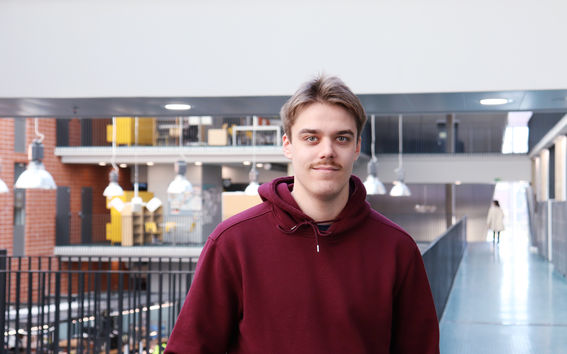Study electrical engineering
Electricity is everywhere, and our society would not function without it. As a student at the School of Electrical Engineering, you can find solutions to issues related to sustainable development and human well-being.

I was searching online for different natural science study programmes, and one of my Google searches took me to the webpage for the Bioinformation Technology major (bioIT). I scanned through the programme’s courses and realised that I was interested in almost every one of them. The programme seemed to suit me just right, so I independently started reading for the entrance exam and then passed the exam first time.
BioIT bachelor’s studies are hard work, but rewarding. The studies are full-time, and the tasks are tackled together with other students, which is the best thing of all. One’s own skills and friendships are strengthened when the work is done together.
The courses on offer are among the broadest in Aalto. There are courses from at least three of the Aalto schools, so students get the chance to see and to study the different operating practices and methods in different fields. The studies in the first couple of years are mostly comprised of basic courses which are chosen with an eye to the several different Life Science Technologies master’s programmes which are on offer. The topics on offer cover the whole spectrum: mathematical statistics, signal processing and related mathematics, chemistry, physics, biology and programming.
Because the studies are very interdisciplinary, the overall picture of the bachelor’s studies can end up rather fragmented. To get the most from the major, you need to work out in good time which of the master’s programmes you aim to go for. An overall grasp of what you are aiming for in the future is helpful for choosing the most important courses. In my case, for example, I have always been interested in bioinformatics, which involves the computerised analysis of biological data and different kinds of machine learning systems tailored for biological data, so I chose already during my bachelor’s studies courses that relate to this. The range of courses on offer at Aalto is so broad and the movement between the schools so free that anyone can certainly find courses that fit with their plans for the future.
I most enjoy programming, because the courses involve plenty of activity and the studies are very absorbing. Perhaps the best thing about the studies is that you get to properly dig into the courses that most interest you. Of course, not all the courses have been enjoyable, but those where I truly get to go deep into the topic have been among the most rewarding experiences during the whole time I have been studying. Nowadays I am thankful that I took the time to dig deep into certain topics.
I’m continually learning to notice and utilise the things I have learnt – such as statistical and machine learning methods in data analysis – in my work in the field and in my studies. Maybe one day I will get to implement completely new methods. Without my bioIT studies this would, in all likelihood, not have been possible.
Thanks to its multidimensional nature, the prospects are great. With a major in the field, you can end up, for example, designing medical devices, consumer products, biomaterials, medicines, or methods for machine learning, analysis or data visualisation – or you could become a cancer researcher. The list is endless! And if a suitable position can’t be found, there’s plenty of space to go wild, as biology’s multidimensional nature provides opportunities to create different kinds of products and methods for research or for consumer marketing, for example. There are endless possibilities in the field for new inventions that not yet been developed. How much more motivating can you get!
Read more about Bioinformation Technology major (in Finnish)
See all the programmes the School of Electrical Engineering offers or read more interviews!

Electricity is everywhere, and our society would not function without it. As a student at the School of Electrical Engineering, you can find solutions to issues related to sustainable development and human well-being.

On this page our students, teachers and alumni will share why they chose to study electrical engineering, what is it like to study at the School of Electrical Engineering and what career paths our alumni have taken.



